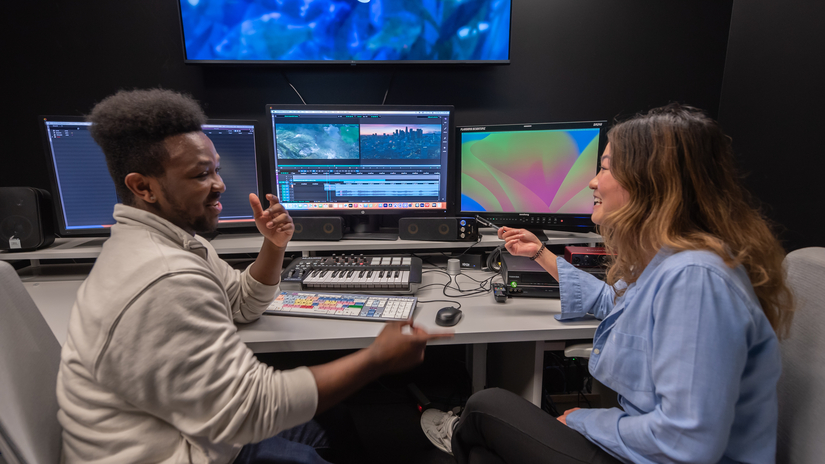MUSIC 71 | Woodwind Instrument Techniques2 unitsTransfer: UC, CSU This course provides instruction in and reinforcement of the basic technical skills need to play instruments of the woodwind family, including embouchure development, standard and auxiliary fingerings, hand position, posture, and diaphragmatic breathing. Instruments of the woodwind family include flute, clarinet, oboe, bassoon, and bass clarinet. |
|---|---|
MUSIC 72 | Brass Instrument Techniques2 unitsTransfer: UC, CSU This course is the study of fundamental techniques, including tone production, fingerings, embouchure and hand position, of standard brass instruments which include trumpet, horn, euphonium, trombone and tuba. |
MUSIC 73A | Percussion Instrument Techniques2 unitsTransfer: UC, CSU Instruction in the basic techniques of concert percussion for beginners, emphasizing snare drum and orchestra bells. Techniques of other instruments, including bass drum, cymbals, triangle, tambourine and timpani will be demonstrated. Students will play individually and in small ensembles. |
MUSIC 73B | Intermediate Percussion Ensemble2 unitsTransfer: UC, CSU
Instruction in percussion and snare drum at a more advanced level than given in Music 73A. Additional instruction will be given in other percussion instruments, such as bass drum, cymbals, timpani, and tambourine. Class rehearsal as well as outside preparation will lead to public performance. |
MUSIC 74 | Orchestra2 unitsTransfer: UC, CSU
This course provides study of musical style and rehearsal techniques as they relate to the performance of orchestra literature. |
MUSIC 74S | Orchestra0.5 unitTransfer: CSU
This course provides study of musical style and rehearsal techniques as they relate to the performance of orchestra literature. Ability to play an orchestral instrument is required. |
MUSIC 75 | Instrumental Chamber Music Repertoire2 unitsTransfer: UC, CSU
The study of musical literature, musical style, rehearsal techniques and ensemble playing as they relate to the performance of instrumental chamber music. |
MUSIC 76 | Intermediate Brass, Woodwinds, and Percussion2 unitsTransfer: UC, CSU
This course is designed as an intermediate level class to continue skill development of the individual brass, woodwind, and percussion instruments and improve reading skills. The course will offer a first-level ensemble experience with emphasis directed to precision, intonation, balance and blend. |
MUSIC 77 | Wind Ensemble2 unitsTransfer: UC, CSU
This course provides study and performance of musical literature written for wind ensemble with emphasis on style and rehearsal technique as they relate to the performance of band literature. Ability to play a band instrument is required. |
MUSIC 77S | Wind Ensemble0.5 unitsTransfer: CSU
This course provides study and performance of musical literature written for wind ensemble with emphasis on style and rehearsal technique as they relate to the performance of band literature. Ability to play a band instrument is required. |
MUSIC 78 | Jazz Ensemble2 unitsTransfer: UC, CSU
This course provides rehearsal and performance of literature written for large jazz ensembles with emphasis on methods and materials. Musical materials include published arrangements of standard tunes, special arrangements of standard tunes, and contemporary compositions in the jazz idiom and selected according to the ability of the group. Ability to play an instrument and instructor’s approval are required. |
MUSIC 79A | Jazz Improvisation2 unitsTransfer: UC, CSU
This course focuses on the development of idiomatic jazz improvisation skills through the study of jazz standard tunes, 12 bar blues, jazz theory, ear training, transcriptions and performance. |
MUSIC 8 | Modulation and Analysis3 unitsTransfer: UC, CSU
This course is designed to integrate the elements of harmonic structure presented in Music 6 and 7 with broader concepts of style so that entire compositions of the common practice period can be analyzed and understood. Emphasis is placed on chord analysis, phrase structure, tonal relationships, and macro-form. As a supplement, an introduction to the melodic and harmonic devices of the 20th Century is given. Correlated with Music 4 (Musicianship). |
MUSIC 84A | Popular Guitar, First Level2 unitsTransfer: UC, CSU The study and performance of popular guitar styles in the range of beginning to intermediate skills of music reading, interpretation and performance. Access to a guitar in good playing condition is required. A limited number of loaner guitars are available for use while enrolled in this course. |
MUSIC 84B | Popular Guitar, Second Level2 unitsTransfer: UC, CSU
The study and performance of popular guitar styles in the range of intermediate difficulty are the goals of this course. The course includes finger styles as found in Folk, Rock, Jazz, and their variations. Access to a guitar in good playing condition is required. A limited number of loaner guitars are available for use while enrolled in this course. |
MUSIC 84C | Popular Guitar, Third Level2 unitsTransfer: UC, CSU
The study and performance of popular guitar styles in the range of intermediate difficulty are the goals of this course. The course includes finger styles as found in Folk, Rock, Jazz, and their variations. Access to a guitar in good playing condition is required. A limited number of loaner guitars are available for use while enrolled in this course. |
MUSIC 87A | Fingerstyle Guitar, First Level2 unitsTransfer: UC, CSU This course focuses on music reading in first-position from beginning to intermediate level and on right- and left-hand skills, using repertoire from Classical, Flamenco, Popular, and other traditions. Access to a guitar in good playing condition is required. A limited number of loaner guitars are available for use while enrolled in this course. |
MUSIC 87B | Fingerstyle Guitar, Second Level2 unitsTransfer: UC, CSU
This course focuses on music reading in first-position at the intermediate level and on right- and left-hand skills, using repertoire from Classical, Flamenco, Popular, and other traditions. Access to a guitar in good playing condition is required. A limited number of loaner guitars are available for use while enrolled in this course. |
MUSIC 88A | Independent Studies in Music1 unitTransfer: CSU Please see “Independent Studies” section. |
MUSIC 88B | Independent Studies in Music2 unitsTransfer: CSU Please see “Independent Studies” section. |




